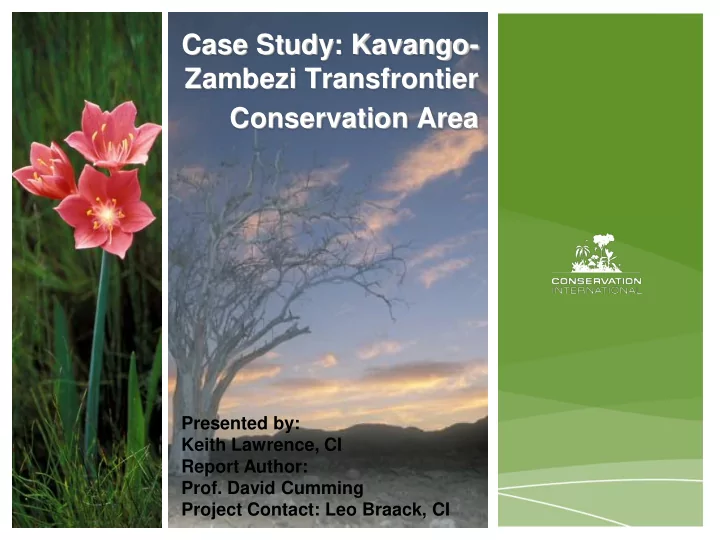

Case Study: Kavango- Zambezi Transfrontier Conservation Area Presented by: Keith Lawrence, CI Report Author: Prof. David Cumming Project Contact: Leo Braack, CI
Presentation Outline Background: KAZA TFCA 1. Getting started / Vision 2. Assessing the ecological landscape 3. Assessing protection and conservation status 4. Assessing resources and policies 5. Designing an integrated landscape 6. Developing and prioritizing strategies
Kavango-Zambezi TFCA
KAZA TFCA 400,000km 2 Globally significant wetlands (e.g. Okavango Delta) Large portions of the Miombo-Mopane & Kalahari-Namib Wilderness Areas 1.5 million people. Population densities of <5 people / km 2 Largest elephant population in the world
CI’s KAZA TFCA work Desk study on large scale conservation planning: Priorities – ranking of PAs Resilience of the KAZA TFCA system to climate change Aim to inform governments and partner NGOs Treaty planned Borders not yet agreed on
December 2006 MOU “To establish a world -class transfrontier conservation area and tourism destination in the Okavango and Zambezi river basin regions of Angola, Botswana, Namibia, Zambia and Zimbabwe within the context of sustainable development .”
Objectives 1. Trans-national cooperation in ecosystems & cultural resource management 2. Alliances & partnerships 3. Harmonize natural resource management approaches & tourism development 4. Mechanisms & strategies for local communities to participate 5. Cross-border tourism to foster regional socio-economic development
2. Assessing the ecological landscape
3. Assessing protection and conservation status 11 types of conservation area 22% of area fully protected, no human settlement 54% settled hunting area / community conservancy Remainder is communal land Currently ineffective & underfunded PAs scored to produce prioritisation of where to work Biological value (diversity, wetlands, endemism, ecosystem processes) Conservation effectiveness (Threats)
4. Resources and policies
5. Designing an integrated landscape Migration corridors Limited evidence of migrations Dispersal corridors e.g. allow elephants to spread away from high-density areas BUT there are dangers of this AND need to preserve some modularity Adaptive response corridors Allow movement in response to climate change
5. Designing an integrated landscape x
6. Developing and prioritizing strategies Water flows and wetlands I. Natural resource governance II. Diversification & adaptive co-management III. Biodiversity linkages & conservation planning IV. Information & participatory science V.
I. Water flows and wetlands Threats: Climate change & upstream flows Integrated catchment management Incentives to upstream land users (PES?) Don’t degrade wetlands
II. Natural resource governance Resources undervalued & people living there unable to realize the benefits Land tenure & access rights reforms needed Mechanisms for benefits to reach local communities
III. Diversification & adaptive co-management Diversity (ecological & cultural) Resilience Human land uses, elephants & fire Homogeneity Need policy frameworks that encourage experimentation, diversification & adaptive capacity
Levin’s 8 commandments for sustainability 1. Reduce uncertainty 2. Expect surprise 3. Maintain heterogeneity 4. Sustain modularity 5. Preserve redundancy 6. Tighten feedback loops 7. Do unto others as you would have them do unto you
IV. Biodiversity linkages & conservation planning Adaptive response corridors Systematic conservation planning Allow for ecosystem processes
V. Information & participatory science Shortage of information on biodiversity, PA status, ecosystem services … Wiki of PAs? Participatory culture needed to share info between governments, NGOs, private sector, academia etc.
Join CORNET: the Corridors Network New email discussion list on conservation in corridors/landscapes ask questions hear about new publications / events promote your work & publications an open space to express opinions discussions on specific topics http://corridors.conservation.org klawrence@conservation.org
Atlantic Forest, Brazil : Connectivity determined by species population dynamics (as opposed to ecological or functional connectivity). Uses graph theory.
Spatial modeling Multiple land uses in landscape Insert biodiversity & economic priorities to influence decisions Platform to facilitate collaboration and negotiation Northern Sumatra & Papua provinces, Indonesia
Other Examples Greater Cederberg Corridor. South Africa : has both interesting design aspects & tangible actions on the ground. Roibos farmers’ adaptations to climate change Step 7 (implementation) Step 2 (assessing landscape, setting goal) BONGOLAVA CORRIDOR, Madagascar : This has a vision; a stakeholder approach; governance; community capacity & monitoring; and various human wellbeing aspects (carbon, health, ecotourism, linking conservation to development) Covers most of the steps
Thank you! Keith Lawrence k.lawrence@conservation.org
Recommend
More recommend